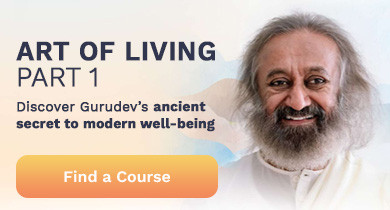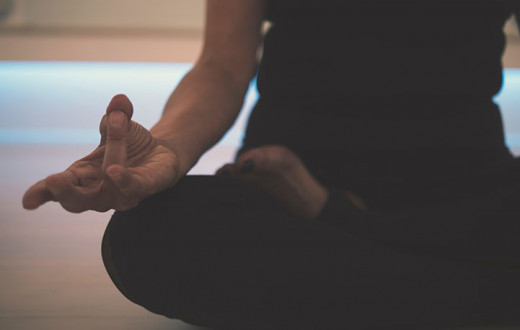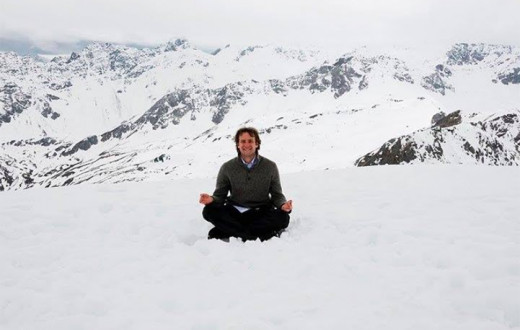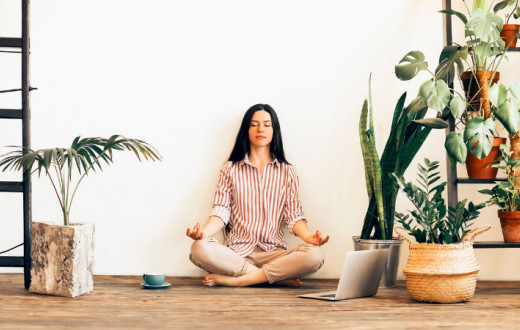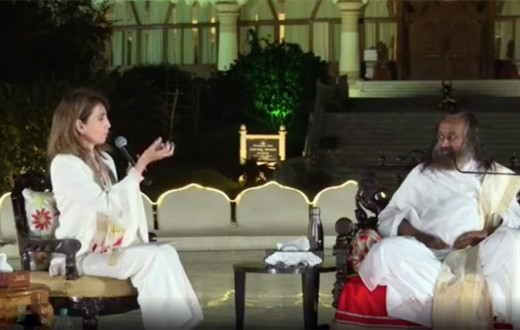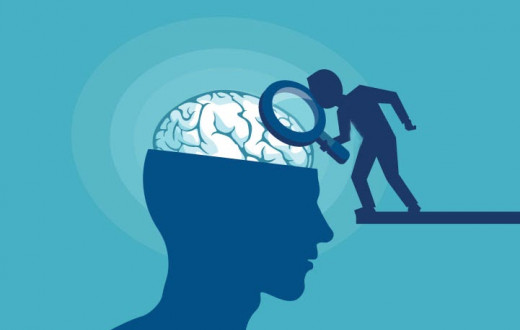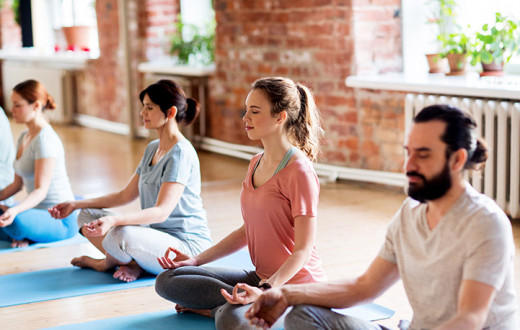By Sejal Shah
Find out 7 ways to know if you are sleeping or actually meditating when you sit for meditation and some tips for you to improve the quality of both.
Have you started your meditation practice just recently? Does the soothing instructions of a guided meditation sound sometimes like a lullaby to you? And do you sometimes feel that you are knocked out instead of meditating? You are not alone. Many novice meditators have the same confusion, were they meditating or sleeping?!
Taking a break from the daily grind to sit and meditate may give your body the impression that it is time for some Zzzs. This is one reason, at one point or another, most meditators find their meditation practice so restful that they feel that they are dozing off right away, and some may actually doze off too!
Both meditation and sleep bring deep relaxation to you, that is why at some level they both seem similar but they are very different. Let us understand more.
The difference between meditation and sleep: How to tell that you are actually meditating and not sleeping?
Beginner meditators often feel that they are sleeping during their meditations when in fact they have entered the meditative state. This is quite natural because until we are familiar with meditation, we associate deep relaxation mainly with sleep.
But after a few regular meditations, an experienced meditator usually realizes that sleep and meditation are quite distinct states. Here are seven ways that you can differentiate the two states:
1) How you feel afterward: clear vs dull
Coming out of sleep or a short nap, one feels a little dull. But emerging from the deeply settled "no mind" state of meditation, one basks in clarity and feels calm, peaceful, and often energetic and joyous.
2) How you breathe: subtle and feeble vs slow
The breathing patterns during deep sleep and meditation are quite different. Deeper states of meditation are associated with very feeble breath or even suspension of breath, whereas in sleep, respiration does reduce, but not as less as in meditation.
In meditation, as the mind quiets and our body relaxes, it needs less oxygen to function, the rate of breath will often diminish dramatically. In fact, studies have shown that expert meditators and yogis have the ability to slow their physiology down to a level where, for seconds at a time, it feels that their breath is suspended! While the regular everyday meditator is not looking (or should not even try or force) to experience this, but this level of physiological slowdown is not really possible when we sleep. It is the level of control over the mind that naturally happens (without any force) that makes meditation so different from sleep. Any kind of unnatural manipulation is a red flag as it could be not only counterproductive but also could be harmful.
3) State of the mind: aware and alert vs sleepy
Perhaps the clearest dividing line between meditation and sleep is our level of awareness. According to Chris Dale, a very senior meditation teacher from the Art of Living, “The key distinction between meditation and sleep is alertness in meditation and non-alertness during sleep. But meditative alertness has a different quality than that of the waking state. To understand that distinction, and also how meditation and sleep are different, we need to consider how the four modes of consciousness—mind, intellect, memory, and ego—operate in the waking, dreaming, and sleeping states and also in the fourth state of consciousness, which is experienced in meditation, traditionally called the turiya state.
In the waking state, the mind, intellect, memory, and ego all function to some extent. In the dream state, only memory (Chitta) works actively. In deep sleep, all four disappear—the consciousness rests--devoid of any activity.
In the meditative state, the mind, which receives input from the senses, goes completely underground. The ego also becomes inactive, but the intellect and Chitta function subtly. Meditation is very similar to sleep, but with a subtle idea or trace of intellect and, in turiya, a spontaneous perception of our real nature.”
5) Rest: Extremely profound vs profound
Meditation and sleep are both hypometabolic states, where breathing and other body activities decline. Both release stress and bring relaxation, but the rest that meditation gives is much deeper than the rest that comes from sleep. Therefore, deeper-rooted impressions, or samskaras, leave the system.
5) Bodily sounds: no sounds vs zzz
The most obvious sign that you are sleeping is that you may start snoring and you start hearing the noise! But if you are in deep meditation, since your breathing rate reduces, you may not even hear the sound of your natural breath.
6) Face: gently smiling vs saliva drooling
Another sign that you are sleeping is that saliva may start drooling out of the corner of your mouth versus in deep meditation, your face is relaxed and may radiate a peaceful gentle smile.
7) Brain waves: alpha or theta vs delta
Whether we are mentally active, resting, asleep, or meditating, the brain always has some level of electrical activity. A 2010 study done by the Norwegian University of Science and Technology suggests that EEG measures different electric brain wave activity as alpha, beta, delta, theta waves during wakefulness, sleep, and meditating state.
Delta waves are characteristic of sleep. Beta waves are characteristic of a wakeful or active state. Alpha and theta waves are characteristics of a meditative state.
If I sleep during meditation, is that okay?
At times, yes, absolutely! But on a regular basis, no!
If you had enjoyed a restful night, your meditation experience is likely to be more energetic and alert. But on the contrary, if you are over-stressed or you have been dealing with sleep deprivation, it should not come as a surprise if you fall asleep while meditating. In fact, if you have been dealing with insomnia, falling asleep during meditation may be frequent for you.
Here again, Chris Dale explains very beautifully, “It is important not to vigilantly guard against sleep during meditation. Instead, it’s better to think of sleep and dullness during meditation as the release of fatigue and stress. For some of us, it will be necessary to go through a lot of sleep and fatigue during meditation, and sometimes even after meditation. It would help to keep in mind that these signs indicate a very beneficial clearing process.”
What can you do to not fall asleep during meditation?
It is likely it could simply be some residual tiredness you experience when you first begin to meditate and that may change over time. However, when sleeping during meditation becomes a regular occurrence, there are several ways to address that and improve your practice:
1. Pay attention to your posture: Meditate sitting up with your back comfortably straight rather than lying down. Lying down naturally encourages a more sleepy state of mind.
2. Find the right place: Avoid meditating on the bed, or near the bed. For most people, the bed means only one thing—sleeping. Create a more conducive space and environment for meditation if you can.
3. Choose appropriate time: Try meditating first thing in the morning when the mind is a little fresh or in the evening before your meals, rather than at night when you are already sleepy before you begin.
4. Ensure good ventilation: Open a nearby window if it’s not too cold out. The fresh air and additional oxygen will help you feel more awake.
5. Say no to food just before starting: Avoid eating a big meal just prior to you starting your practice, as this tends to make the body feel very heavy and naturally leads to sleep. Also, pay attention to the quality and quantity of your meals. On a daily basis, as much as possible, eat fresh, more plant-based, nutrition-rich foods. Calorie-dense, non-plant-based, stale, frozen, food may set in the tendency to sleep during meditation.
6. Have enough sleep: Make sure you get enough sleep and if you haven't, be sure to take the appropriate steps to get 6-8 hours of sleep on most nights. The Journey meditation app has some beautiful sleep support meditations and expeditions. Ocean or Ujjayi breathing also helps you to sleep well.
Can meditation replace sleep?
No.
Sleep is very important for our rejuvenation and well-being. If you don’t sleep enough, it is definitely going to have an adverse effect on your health. Meditation is not a replacement for sleeping.
The quality of the rest that you get during meditation is definitely more profound. Therefore it is being said that the rest that you get during 20-30 minutes of meditation is almost like four hours of sleep or the rest that meditation provides is 2-5 times deeper than the sleep. And over a period of a few years of regular meditation practice, you may require less sleep. Having said this, it is not at all advisable to drastically or intentionally cut down your sleep. If that happens naturally, let it happen.
Can meditation help me sleep better?
Yes!
Among many benefits of meditation, enhanced quality of sleep ranks higher on the list. In fact, independent research on SKY breath meditation indicates that SKY practitioners spent 13% of their total sleep time in a deeper restful SWS state (stages 3 & 4 sleep), whereas the control group spent only 4% time.
What is SKY breath meditation, how can I learn more about it?
A very gentle rhythmic breathwork that naturally brings you to the doorway of meditation, SKY offers a whole lot of benefits. A 2020 study published in the International Journal of Yoga, explains that a single session of SKY Breath Meditation generates global brain rhythm. This suggests that SKY leads to better attention, memory, and emotional and autonomic control along with enhanced cognitive functions, which finally improves physical and mental well-being.
You can learn more about SKY here. Or if you would like to have all your questions answered by an instructor and long-time practitioner, I would recommend and encourage you to attend a free introductory online session.
In short, sleep while you sleep, meditate while you meditate : )! Hope this article provided many tips to improve both your sleep as well as meditation. Know that both have a positive impact on each other. Sleep well. Meditate well. Enjoy both!!!
Sejal Shah, E-RYT 500 Sri Sri Yoga Teacher, YACEP, C-IAYT, Meditation Teacher, Happiness expert, NYU Post Graduate Medical School approved Yoga-CME retreat facilitator, Mind-Body Wellness Writer, Homeopath. She can be followed on YouTube, Instagram, Twitter, and Facebook.

